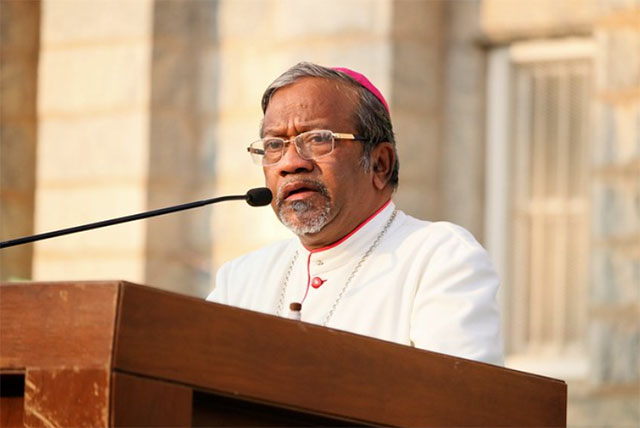From Our Special Correspondent
Daijiworld Media Network
Bengaluru, Dec 4: The proposed Anti-Conversion Bill that is to be introduced in the Belagavi session of the Stage Legislature commencing from December 13 ‘is a shame on the secular principles outlined by the Indian Constitution’, said Archbishop of Bangalore Most Rev Dr Peter Machado, in a statement on Saturday.
The Archbishop, who is the President of the Karnataka Regional Catholic Bishops’ Council and Chairman of All Karnataka United Christian Forum for Human Rights, asked allsecular sections should raise their voice united on this dangerous law and said it is better to foresee communal violence before it really takes place.











He demanded that the State Government should not table the bill.
The Archbishop pointed out that the Chief Minister and his cabinet colleagues have on several occasions reiterated that the State Government will table the bill on Anti-Conversion, during the upcoming winter session of the Assembly in Belagavi.
“The entire Christian Community in Karnataka opposes the proposal of Anti-Conversion Bill in one voice and questions the need for such an exercise when sufficient laws and court directives are in place to monitor any aberration of the existing laws,’’ Archbishop Machado said.
He pointed out that the BJP MLA from Hosadurgain Chitradurga district Goolihatti Shekhar during the recentmonsoon session of the Karnataka Assembly, claimed religious conversions ‘by force or through inducement’ and was ‘rampant’ across the state.
The MLA also claimed that 15,000 to 20,000 people, including his own mother, were converted to Christianity in his constituency, the Archbishop said.
He pointed out that Hosadurgataluk Tahsildar conducted an enquiry into allegations made by the MLA Goolihatti Shekhar, and the result of the enquiry stated that there were no such attempts of forced conversions and that those who are converted to Christianity, did it out of their own willingness and conviction.
“If there were rampant conversions, as claimed by the MLA and others, the Christian population should, both in state and nation should have seen an increase. But the facts and figures indicate that orchestrated hue and cry over religious conversion is nothing but a futile exaggeration,’’ the Archbishop said.
According to State Government’s own data and the Census of India, the all-India percentage of Christian Population in the country in 2001 was 2.34 percent and in 2011, it shrunk to 2.30 percent, similarly in Karnataka the situation is no different.
The statistics give a clear picture that the Christian Population in the state of Karnataka, during the 2001 census amounted to 1.91 percent, while it significantly decreased to 1.87 percent in the year 2011.
According to media reports, the Anti-Conversion Bill in Karnataka will be ready by December 5, to be tabled in the next legislature session beginning from December 13.
Following are a few serious issues the community is concerned:
1. The Anti-Conversion Bill is primarily targeted against the minorities. All minorities and secular sections will have to raise a united voice against this.
2. The first Anti-Conversion Law was passed in Orissa in 1967. The attacks on the Christians began from 70s onwards, culminating in Kandamal genocide in 2007 and 2008.
The law gave a justification for the attacks on the Christians: Assemblies of God, Baptist Church, Believers Eastern Church, Roman Catholic Church, Church of South India, FCC0, Jacobite Syrian Orthodox Church, Lutheran Church, Malankara Orthodox Church, Marthoma Syrian Church, Methodist Church and Seventh Day Adventists.
3. After Odisha, the Anti-Conversion Law was passed in 6 other states in India. Not much resistance was put up against such an undemocratic law. As a result, the attacks on the Christians increased in all these states.
4. Today, there is enough documentation to show that persecution of Christians is taking place in every state and every union territory in India. The proposed law will only make the situation worse.
5. The issue of forced conversion is a highly exaggerated subject. Many of our BJP leaders have studied in Christian schools and they have also chosen Christian hospitals for the medical treatment. None of them were forcefully converted.
6. In Kandamal, forced conversion has taken place by the Hindutva forces pacing axes on the necks of the Adivasi Christians and Dalit Christians.
They were forcefully converted to Hinduism. The culprits are not punished despite the Anti-Conversion Law. All the victims still go to church and believe in their own original faith, despite the use of force in 2008. Faith is something that is deeply personal and cannot be forced.
7. In case when there is a case of forced conversion taking place, the present law under the Indian Constitution is more than sufficient to deal with such situations. There is no need for any additional law.
8. Anti-Conversion Law is a violation of the basic foundations of the Indian Constitution. It violates many articles in the Indian Constitution. Even Ambedkar who was the chief architect of Indian Constitution had converted to Buddhism without the permission of the state.
9. The Anti-Conversion Law is a shame on the secular principles outlined by the Indian Constitution. All secular sections should raise their voice united on this dangerous law. It is better to foresee communal violence before it really takes place.
10. The process of passing such a law in hurried manner itself is faulty. The Karnataka Government says that the draft of the bill will be ready on December 5 and it will be tabled in the legislature session starting from December.
11. So, where is the time and space for a public discussion? In crucial matters of this order, in a democracy, no bill should be allowed to be tabled without a proper public discourse. The bill should not be allowed to be tabled.